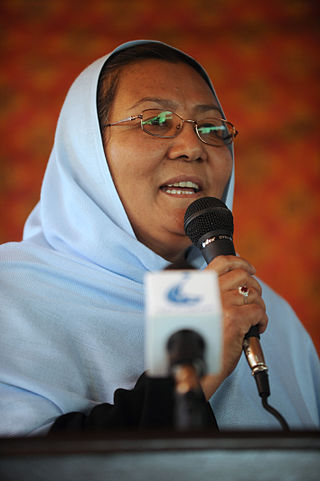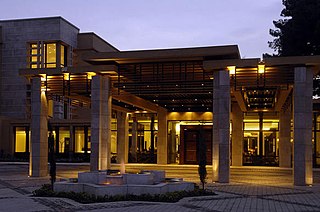Related Research Articles

The Taliban, which also refers to itself by its state name, the Islamic Emirate of Afghanistan, is a militant organization in Afghanistan with an ideology comprising elements of Pashtun nationalism and the Deobandi current of Islamic fundamentalism. It ruled approximately three-quarters of the country from 1996 to 2001, before being overthrown following the American invasion. It recaptured Kabul on 15 August 2021 following the departure of most coalition forces, after nearly 20 years of insurgency, and currently controls all of the country. However, its government is not recognized by any country. The Taliban government has been internationally condemned for restricting human rights in Afghanistan, including the right of women and girls to work and to have an education.

The treatment of women by the Taliban refers to actions and policies by various Taliban regimes which are either specific or highly commented upon, mostly due to discrimination, since they first took control in 1996. During their first rule of Afghanistan (1996–2001), the Taliban were notorious internationally for their misogyny and violence against women. In 1996, women were mandated to wear the burqa at all times in public. In a systematic segregation sometimes referred to as gender apartheid, women were not allowed to work, nor were they allowed to be educated after the age of eight. Women seeking an education were forced to attend underground schools, where they and their teachers risked execution if caught. They were not allowed to be treated by male doctors unless accompanied by a male chaperone, which led to illnesses remaining untreated. They faced public flogging and execution for violations of the Taliban's laws.

Gulbuddin Hekmatyar is an Afghan politician, former mujahideen leader and drug trafficker. He is the founder and current leader of the Hezb-e-Islami Gulbuddin political party, so called after Mohammad Yunus Khalis split from Hezbi Islami in 1979 to found Hezb-i Islami Khalis. He has twice served as Prime Minister during the 1990s.

Dr. Habiba Sarābi is a hematologist, politician, and reformer of the reconstruction of Afghanistan after the Taliban first took power. In 2005, she was appointed as Governor of Bamyan Province - the first Afghan woman to become a provincial governor. She had served as Afghanistan's Minister of Women's Affairs and as Minister of Culture and Education. Sarabi was instrumental in promoting women's rights and representation and environmental issues. She belongs to the ethnic Hazara people of Afghanistan. Her last name is sometimes spelled Sarobi.
During the War in Afghanistan, according to the Costs of War Project the war killed 176,000 people in Afghanistan: 46,319 civilians, 69,095 military and police and at least 52,893 opposition fighters. However, the death toll is possibly higher due to unaccounted deaths by "disease, loss of access to food, water, infrastructure, and/or other indirect consequences of the war." According to the Uppsala Conflict Data Program, the conflict killed 212,191 people. The Cost of War project estimated in 2015 that the number who have died through indirect causes related to the war may be as high as 360,000 additional people based on a ratio of indirect to direct deaths in contemporary conflicts.

Women's rights in Afghanistan have oscillated back and forth depending on the time period as well as the regime in power. After King Amanullah Khan's attempts to modernize the country in the 1920s, women officially gained equality under the 1964 Constitution. However, these rights were taken away in the 1990s through different temporary rulers such as the mujahideen and the Taliban during the Afghan civil war. During the first Taliban regime (1996–2001), women had very little to no freedom, specifically in terms of civil liberties. When the Taliban was overthrown by the United States following the 9/11 attacks, women's rights gradually improved under the presidential Islamic Republic of Afghanistan. Women were de jure equal to men under the 2004 Constitution.

Afghanistan–India relations are the diplomatic relations between India and Afghanistan. They had been historical neighbors and shared cultural ties through Bollywood and cricket.
The February 2010 Kabul attack on 26 February 2010 was a combined suicide bombing and shooting attack. A car bomb levelled the Arya Guesthouse, also known as the Hamid Guesthouse, popular with Indian doctors. Two armed attackers then entered the nearby Park Residence, housing other foreigners. One detonated a suicide bomb, and the other was shot dead. The Safi Landmark Hotel nearby was badly damaged by the blasts. At least 18 people were killed and 36 more were injured.

Afghanistan–United Arab Emirates relations refers to the bilateral diplomatic relations between Afghanistan and the United Arab Emirates (UAE). In December 2022, Afghan Defense Minister Mullah Yaqoob along with Anas Haqqani made an official visit to the UAE. There he met with UAE President Mohamed bin Zayed Al Nahyan and Vice President Mohammed bin Rashid Al Maktoum.
The Great Game: Afghanistan is a British series of short plays on the history of Afghanistan and foreign intervention there, from the First Anglo-Afghan War to the present day. It is organised into three sets of four plays and draws its name from the 19th and 20th century Great Game, a geopolitical struggle for dominance between The British and Russian Empires. The main plays are linked by monologues and duologues giving historical background and verbatim theatre edited by Richard Norton-Taylor from modern figures linked with western involvement in Afghanistan, such as William Dalrymple, Hillary Clinton, Stanley McChrystal and David Richards.

Afghanistan–Denmark relations refers to bilateral relations between Afghanistan and Denmark. Afghanistan is represented in Denmark through its embassy in Oslo, Norway. Denmark used to have an embassy in Kabul until it was closed in 2021. Denmark has 760 soldiers in Afghanistan, operating without caveat and concentrated in Helmand Province. Relations between the two countries are friendly. About 9578 Afghans live in Denmark.
There used to be a small community of Indians in Afghanistan who are Afghans of Indian origin as well as Indian construction and aid workers involved in rebuilding and humanitarian assistance efforts. India is often described as acting as a soft power in Afghanistan. Having committed a $2.3 billion aid programme, India is one of the largest donors to Afghanistan, investing in the economy, humanitarian aid, education, development, construction and electrical. According to Foreign Policy among Afghans there is a positive perception of India's role in the reconstruction efforts in Afghanistan.

Prisoners of Hope: The Story of Our Captivity and Freedom in Afghanistan is the 2003 memoir of Christian aid workers Dayna Curry and Heather Mercer. The book details their early lives, their humanitarian work in Afghanistan, and their three months of imprisonment by the Taliban in 2001.

On 20 March 2014, Taliban militants carried out a mass shooting in the restaurant of the Kabul Serena Hotel, in Kabul, Afghanistan. The shooting, which took place in a hotel popular with foreigners and wealthy Afghans, killed nine civilians, including five foreigners. The attack was a shock to many as it took place in a heavily fortified area of Kabul.

Damien Gavin Lewis is a British author and filmmaker who has spent over twenty years reporting from and writing about conflict zones in many countries. He has produced about twenty films.

Suraya Dalil, is an Afghan physician and politician who served as Minister of Public Health from 2010 to 2014 and has been the country's Permanent Representative to the United Nations since November 2015.
On 24 January 2018, militants affiliated with Islamic State of Iraq and the Levant – Khorasan Province launched a bomb and gun attack on a Save the Children office in Jalalabad, a city in the eastern Afghan province of Nangarhar, killing six people and injuring 27.

Karte Char, literally Fourth Quarter, is a neighborhood in western Kabul, Afghanistan, part of District 3. It is located by the Sevom Aqrab Road that goes to Kote Sangi, and is located very close to Kabul University, Kabul Zoo, the Gardens of Babur and the Darulaman Road. It is a planned and urbanized locality but it suffered greatly during the 1990s civil war and was one of the city's worst-hit. Karte Seh is located south across the Chamcheh Mast river crossed by Pul-e Surkh.
Shelter Now is an international Christian humanitarian aid organization based in Germany and with operations focused in Afghanistan. Shelter Now began its work in the late 1970s, but did not formally register as an international aid organization until 1983. From 1988, the organization's activities focused on providing aid to Afghan refugees who were displaced during the Soviet–Afghan War, which lasted from 1979 to 1989. The organization's work included developing factories for producing roof-building materials and rebuilding irrigation systems.
Nargis Nehan is an Afghan former politician who served as the acting Minister of Mines, Petroleum and Industries.
References
- ↑ Ellis, Deborah (2000). Women of the Afghan War . Greenwood Publishing. p. 201. ISBN 0275966178.
- ↑ "Afghan woman braves risks to aid children". The Bluffton Icon. Retrieved 26 September 2017.
- ↑ "Forbidden Lessons in a Kabul Guesthouse, By Suraya Sadeed (with Damien" . The Independent. 19 November 2012. Archived from the original on 25 May 2022. Retrieved 26 September 2017.
- ↑ Sadeed, Suraya (10 July 2011). "Woman on a mission". The Daily Telegraph. ISSN 0307-1235 . Retrieved 26 September 2017.
- ↑ Chesler, Phyllis (2013). An American Bride in Kabul: A Memoir. Macmillan. p. 193. ISBN 978-0230342217 . Retrieved 3 October 2017.
- ↑ "Inshallah: Diary of an Afghan Woman on iTunes". iTunes Store. Retrieved 26 September 2017.
- ↑ "Film Festival Examines Afghan History | The Mason Gazette | George Mason University". gazette.gmu.edu. Retrieved 26 September 2017.
- ↑ Fox, Lorna Scott (29 July 2011). "Forbidden Lessons in a Kabul Guesthouse by Suraya Sadeed, with Damien Lewis – review". The Guardian. ISSN 0261-3077 . Retrieved 26 September 2017.
- ↑ Staff. "Forbidden Lessons in a Kabul Guesthouse". Publishers Weekly. Retrieved 3 October 2017.